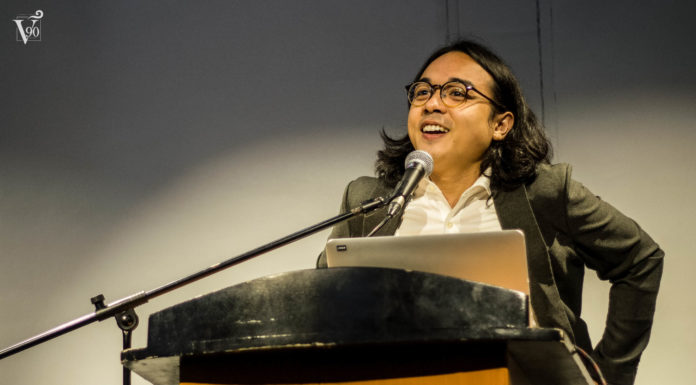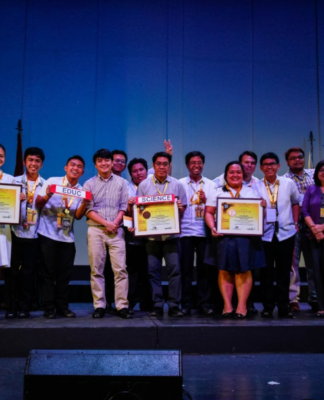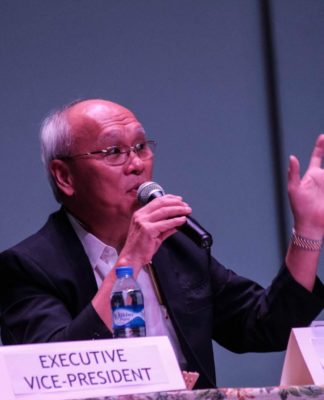A THOMASIAN has entered the Top 10 of the bar exams for the first time in nearly a decade, while UST’s passing rate jumped to 88.52 percent in what has become a doubly memorable Quadricentennial year for the Faculty of Civil Law.
Christian Louie Gonzales ended UST’s nine-year drought in the bar exams, placing fifth with a score of 84.09 percent.
UST posted a passing rate of 88.52 percent for first-time takers with 54 out of 61 examinees making to the cut.
Civil Law faculty secretary Arthur Capili said the official passing rate of UST for this year has yet to be released by the Office of the Bar Confidant of the Supreme Court. In 2010, UST had a passing rate of 68 percent with 70 out of 103 aspirants passing the exam.
“I’m really surprised. I really couldn’t believe it at first since I did not graduate top of the class,” said Gonzales in an email sent to the Varsitarian. “I was never part of the dean’s list when I was in law school.”
Gonzales, who is also a certified public accountant, finished Accountancy at the Union Christian College in La Union in 2004.
Leading this year’s bar exam passers is Raoul Angelo Atadero of Ateneo de Manila University (85.53 percent). Following him are fellow Ateneo student Luz Danielle Bolong (84.56 percent), Cherry Liez Rafal-Roble of Arellano University (84.46 percent), and Rosemil Bañaga of Notre Dame University in Cotabato City (84.12 percent), who placed second, third, and fourth, respectively.
The national passing rate, meanwhile, rose to 31.95 percent—the second-highest in the last decade—from 20.26 percent in 2010. A total of 1,913 out of 5,987 examinees passed, a significant improvement from the previous year’s 982 out of 4,847.
Supreme Court Associate Justice Roberto Abad, a former Civil Law dean, headed the 2011 Bar Committee. Major changes were made to the bar exams, such as the adoption of multiple-choice questions on the first three exams days and essay-type questions on the last day. Multiple-choice questions had a weight of 60 percent, while essay questions weighted 40 percent.
“The results of the recent bar exams confirmed that UST indeed belongs to the premiere law schools in the country,” Civil Law Dean Nilo Divina said, adding that the collective efforts of academic officials, faculty members, and students to boost UST’s performance in the bar exams are paying off.
Civil Law conducted mock bar examinations, which adopted multiple-choice questions and memorandum writing a year before the examinations to familiarize students with the new system, Divina said.
He added that Civil Law continues to lure top students from other colleges and universities through scholarship grants.
“If we’re able to attract best students from the undergraduate courses, it’s very possible [for UST] to have consistent bar topnotchers and the passing percentage would likewise increase significantly [in the coming years],” Divina said.
Since 2010, about 90 freshmen and sophomore students have been enjoying the scholarship grants, which also cover books and housing subsidies. Last June, Civil Law alumnus Reginaldo Oben donated P2 million to the faculty’s scholarship fund.
In a press release, Abad said the Supreme Court introduced changes in the bar exams “to exert pressure on law schools to re-examine the substance and shape of legal education.”
“First, by asking multiple choice questions or MCQs in the bar exams, the Court has put a stop to the practice of requiring students to memorize the law and its principles. Second, with the help of the academe, the Supreme Court has redefined the objective of the bar exams and the competence and skills that they should measure. Third, we have begun giving essay-type problems in the Bar examinations that would measure the candidate’s depth of learning and intelligence,” he said.
The bar exams were held in UST, the country’s oldest law school, last November for the first time.
Successful examinees will take their oaths on March 21 at the Philippine International Convention Center.
In 2002, Arlene Maneja topped the bar exams while Prudence Angelita Kasala placed eighth in 2000. Carla Sta. Maria placed fifth in 1994, while Benigno Par placed fourth in 1998.
Diosdado Macapagal and Roberto Concepcion topped the Bar in 1936 and 1924, respectively. Rafael L. Antonio
















